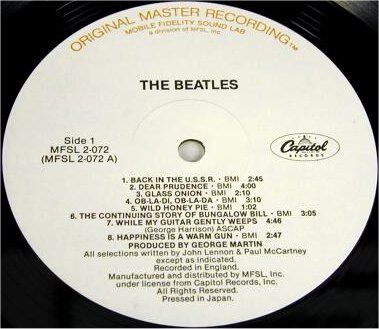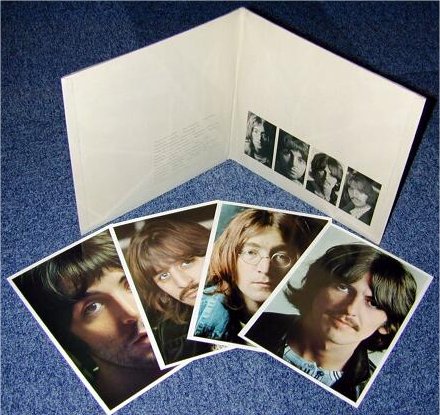
 |
| The Beatles (a.k.a. The White Album) - Double Album |
 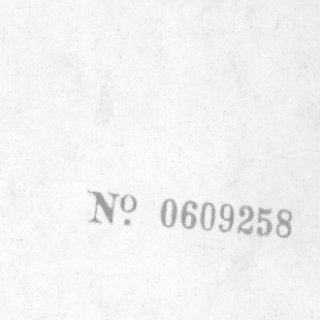
|
| The Beatles (a.k.a. The White Album) - NOT the actual cover, But rather, two parts of the cover edited to show the embossed title, and the numbering in detail. |
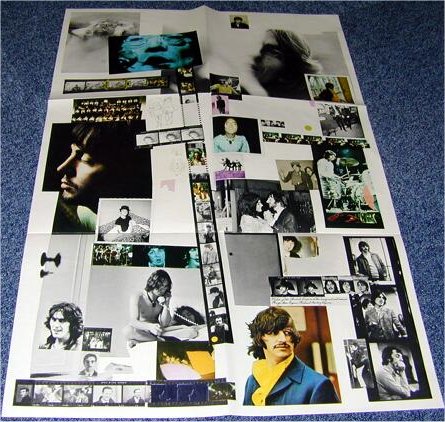 |
| The Beatles (a.k.a. The White Album) - The Poster |
| Label | Apple | ||||||||||||||||||||||||||||||||
| Catalogue No.'s | PMC 7067/8 (Mono) PCS 7067/8 (Stereo) CDP 7 46443 8 CDP 4 96895 2 (Special Edition) |
||||||||||||||||||||||||||||||||
| Matrix No.'s |
|
||||||||||||||||||||||||||||||||
| Release dates | 22nd November 1968 16 January 1979 (White Vinyl) 24th August 1987 (CD) 23rd November 1998 (CD Special Edition) |
||||||||||||||||||||||||||||||||
| Total time | 93:09 | ||||||||||||||||||||||||||||||||
| U.K. Album Chart Detail : |
| ||||||||||||||||||||||||||||||||
| Detail : | The Beatles tenth official album release, their FIRST double, and their FIRST on Apple. The proper name of the album is simply, "The Beatles", but almost immediately it became known affectionately as "The White Album" due to it's packaging. What is true, is that this was the first release by The Beatles which contains purely solo material. In fact, some tracks are even recorded that way, for example, "Julia" was a solo Lennon recording - his first ever. Once again The Beatles had over a quarter of a million advance orders, and of course went straight to number 1. This was the first double album EVER to get to the top slot where it stayed for 7 weeks in a row. It sold so many, that once again The Beatles also made the singles chart, consequently the ONLY double album to ever enter that chart. By the end of the year, just over a month later, the white album had sold over 4,000,000 copies worldwide, and by the end of 1970 global sales were around 6.5 million. At that time this was the biggest selling double album of all time, but just a few years later was topped by "Saturday Night Fever".
The sleeve design was by Richard Hamilton, who suggested the minimalistic approach and the consecutively numbered sleeves
which would give a limited edition feel to it. Richard also came up with the montage idea for the large free poster, which
included the lyrics on it's rear. The four free colour prints were taken by John Kelly.
Also recorded during the sessions for "The Beatles, The album was also part of "The Beatles Collection" 13 album box set (see Beatles Collection).
On 24th August 1987 this album had it's first release on C.D. which was published in stereo, with a catalogue number of
CDP 7 46443 8
The C.D. was also part of "The Beatles Box" 15 C.D. box set (see Beatles C.D. Box). The C.D. was re-released in a special edition on 23rd November 1998 on catalogue number CDP 4 96895 2.
09/09/09 (Number Nine, Number Nine, Number Nine) - the album was re-released as part of the Beatles In Stereo Remasters collection.
Tape Media
Prior to 1973: In November 1988 the double album was re-released on twin cassette tape (stereo only) - Catalogue number - TC2-PCS 4501.
|
| Track | Composer | Recording Information | Time |
| Back In The U.S.S.R. | Lennon-McCartney | Recorded 22nd August 1968 - 5 takes Overdubs 23rd August 1968 onto take 5, creating take 6 Final mix - take 6. Recorded by a three-piece band as Ringo had walked out. Paul played the drum part. |
2:45 |
| Dear Prudence | Lennon-McCartney | Recorded 28th August 1968 in 1 take ... with overdubs on the next two days. Final mix - take 1. |
3:54 |
| Glass Onion | Lennon-McCartney | Recorded 11th September 1968 - 34 takes Overdubs 12/13/16th September 1968 onto take 33 Final overdubs 10th October 1968 onto take 33 Final mix - take 33. |
2:18 |
| Ob-La-Di Ob-La-Da | Lennon-McCartney | Recorded 3rd July 1968 - 7 takes Vocal overdubs 4th July 1968 onto take 4 creating "new" take 5 Overdubs 5th July 1968 onto take 5 Re-make 8th July 1968 - 13 takes (1-13) Re-Re-make 9th July 1968 - 2 takes (20-21) Then take 13 returned to, and overdubbed to become take 22 ! Overdubs 11th July 1968 onto take 22 creating takes 23 & 24 New lead vocal 15th July 1968 onto take 23 Final mix - take 23. |
3:07 |
| Wild Honey Pie | Lennon-McCartney | Recorded 20th August 1968 - 1 take Final mix - take 1. |
0:52 |
| The Continuing Story Of Bungalow Bill | Lennon-McCartney | Recorded 8th October 1968 - 3 takes Final mix - take 3. |
3:13 |
| While My Guitar Gently Weeps | Harrison | Recorded 25th July 1968 - 1 take (Demo acoustic version) Recorded 16th August 1968 - 15 takes (1-15) Overdubs 3rd September 1968 creating take 16 ... this version scrapped New version recorded 5th September 1968 - 28 takes (17-44) Eric Clapton's overdub 6th September 1968 onto take 25 Final mix - take 25. |
4:44 |
| Happiness Is A Warm Gun | Lennon-McCartney | Recorded 23rd September 1968 - 45 takes (backing tracks only) Recording 24th September 1968 - 25 takes (46-70) (still backing tracks only !) Vocal overdubs 25th September 1968 onto takes 53 & 65 combined (known as "take 65") Final mix - take 65. |
2:42 |
| Track | Composer | Recording Information | Time |
| Martha My Dear | Lennon-McCartney | Recorded 4th October 1968 - 1 take Overdubs 5th October 1968 onto take 1 Final mix - take 1. |
2:29 |
| I'm So Tired | Lennon-McCartney | Recorded 8th October 1968 - 14 takes Final mix - take 14. |
2:03 |
| Blackbird | Lennon-McCartney | Recorded 11th June 1968 in 32 takes Final mix - take 32. |
2:18 |
| Piggies | Harrison | Recorded 19th September 1968 - 11 takes (backing track only) Vocal overdubs 20th September 1968 creating take 12 Final overdubs 10th October 1968 onto take 12 Final mix - take 12. |
2:04 |
| Rocky Raccoon | Lennon-McCartney | Recorded 15th August 1968 in 10 takes Final mix - take 10. |
3:33 |
| Don't Pass Me By | Starkey | Recorded 5th June 1968 - 6 takes Overdubs 6th June 1968 onto take 5 creating take 7 Overdubs 12th July 1968 onto take 7 Starting edit piece recorded 22nd July 1968 Final mix - take 7 + start edit piece |
3:50 |
| Why Don't We Do It In The Road | Lennon-McCartney | Recorded 9th October 1968 - 5 takes Overdubs 10th October 1968 onto take 5 creating take 6 Final mix - take 6. |
1:40 |
| I Will | Lennon-McCartney | Recorded 16th September 1968 - 67 takes Take 19 - included "Can You Take Me Back Where I Came From" Take 35 - included "Step Inside Love", "Los Paranoious", and "The Way You Look Tonight" Take 65 was overdubbed to take 68 Overdubbed 17th September 1968 onto take 68 Final mix - take 68. |
1:44 |
| Julia | Lennon-McCartney | Recorded 13th October 1968 - 3 takes Final mix - take 3. |
2:53 |
| Track | Composer | Recording Information | Time |
| Birthday | Lennon-McCartney | Recorded 18th September 1968 - 22 takes Final mix - take 22. |
2:42 |
| Yer Blues | Lennon-McCartney | Recorded 13th August 1968 - 17 takes Overdubs 14th August onto takes 16/17 Final mix - takes 16/17. |
4:00 |
| Mother Nature's Son | Lennon-McCartney | Recorded 9th August 1968 - 25 takes Overdubs 20th August 1968 onto take 24 creating take 26 Final mix - take 26. |
2:47 |
| Everybody's Got Something To Hide Except For Me And My Monkey |
Lennon-McCartney | Recorded 27th June 1968 - 8 takes Overdubs 1st July 1968 onto take 8 creating takes 9 & 10 Overdubs onto take 10 creating takes 11 & 12 Final mix - take 12. |
2:24 |
| Sexy Sadie | Lennon-McCartney | Recorded 19th July 1968 - 21 takes Remade 24th July 1968 - 23 takes (25-47) Re-remade 13th August 1968 12 takes (numbered 100-111 !) Overdubs 21st August 1968 onto take 107, creating takes 112-117 Final mix - take 117. |
3:15 |
| Helter Skelter | Lennon-McCartney | Recorded 18th July 1968 - 3 takes Re-make 9th September 1968 - 18 takes (4-21) Overdubs 10th September 1968 onto take 21 Final mix - take 21 |
4:29 |
| Long, Long, Long | Harrison | Recorded 7th October 1968 - 67 takes Overdubs 8th October 1968 onto take 67 Overdubs 9th October 1968 onto take 67 Final mix - take 67. |
3:03 |
| Track | Composer | Recording Information | Time |
| Revolution I | Lennon-McCartney | The FIRST track recorded for the album. Recorded 30th May 1968 - 16 takes (numbered 1-10, & 13-18) Overdubs 31st May 1968 onto take 18 creating take 19 Overdubs 4th June 1968 onto take 19 creating take 20 Overdubs 21st June 1968 from take 20 creating takes 21 & 22 Final mix - take 22. |
4:14 |
| Honey Pie | Lennon-McCartney | Recorded 1st October 1968 - 1 take Overdubs 2nd October 1968 onto take 1 Overdubs 4th October 1968 onto take 1 Final mix - take 1. |
2:41 |
| Savoy Truffle | Harrison | Recorded 3rd October 1968 - 1 take Vocal overdub 5th October 1968 onto take 1 Overdubs 11th October 1968 onto take 1 Final mix - take 1. |
2:54 |
| Cry Baby Cry | Lennon-McCartney | Recorded 16th July 1968 - 12 takes Overdubs 18th July 1968 onto take 12 Final mix - take 12. |
2:34 |
| Revolution 9 | Lennon-McCartney | Bits extracted from Take 18 of "Revolution I" 6th June 1968 - more creative add-ins 10th June 1968 - more creative add-ins 11th June 1968 - more creative add-ins 20th June 1968 - final creative add-ins 25th June 1968 - Completed. The timing of 8:47, reflects 27 seconds of "Can You Take Me Back", plus 8:20 |
8:47 |
| Good Night | Lennon-McCartney | Recorded 28th June 1968 - 5 takes Recorded 2nd July 1968 10 takes (6-15) Remade 22nd July 1968 in 12 takes (23-34) Final mix - take 34. |
3:10 |
| "Back In The U.S.S.R." | The airplane overdubs occur in different places on the mono and stereo versions. |
| "Ob-La-Di Ob-La-Da" | The stereo version has hand-clapping during the intro, the mono version does not. |
| "While My Guitar Gently Weeps" | The stereo version has some vocal sounds from George at the end, the mono version does not. |
| "Blackbird" | The bird sound effects are quite different between the stereo and the mono release. |
| "Piggies" | The pig sound effects are quite different between the stereo and the mono release. |
| "Don't Pass Me By" | The mono version is much faster than the stereo, and therefore is shorter. The violin sounds at the end are markedly different. |
| "Why Don't We Do It In The Road" | The stereo version has hand-clapping during the intro, the mono version does not. |
| "I Will" | The stereo version has more prominent bongos. |
| "Birthday" | The stereo version has extra vocals at the end of the second chorus. |
| "Sexy Sadie" | The stereo version has two taps on the tambourine during the intro, the mono version only has one. |
| "Helter Skelter" | The stereo version has a fade-out/fade-in dummy ending with Ringo's shout of "I've got blisters on my fingers", the mono version does not ! ... this makes the stereo version almost a minute longer. |
| "Long, Long, Long" | The stereo version is fine, but on the mono, George's double-tracked vocal is embarrassingly out of synch. |
| "Honey Pie" | The stereo version has a shorter guitar solo than the mono version. |
The standard Apple label.Second Pressings (1973) - Stereo version ONLY
The label DOES have "Sold in the U.K..." statement.
My stereo copy has "An E.M.I. recording" printed on the left above the 33 1/3 text, my mono copy does not. I can't say whether that's fixed on all variants though.
The sleeves are gatefold and are top opening, the front of which has an embossed "The Beatles", and a unique stamped serial number. Obviously the lower the stamped number the greater the value, so 0050,000 would be about £100, whereas 0000010 could be worth £5,000.
(My numbers, bought on the day of release in the county of Essex in England, are : Mono - 0609258, Stereo - 0387593)
The inner sleeves are black, and the album contains a free poster and four colour prints.
As above, except, the sleeves are un-numbered, the gatefold openings are at the two opposite ends of the sleeves and the inner sleeves are white.Third Pressings (1982) - Mono version ONLY
BUT, such are the vagaries of the printing plants, there are also numbered versions around of the end-opening sleeves.
Once again, the sleeves are un-numbered, the gatefold openings are at the two opposite ends of the sleeves and the inner sleeves are white, the Apple is light green and the vinyl is lightweight.The MONO version of the White Album was deleted 31st January 1986.
Fourth Pressings (1995) - Stereo version ONLY
Standard Apple label.
Gatefold sleeve, poster and four prints.
The gatefold sleeve has a printed statement which reads:
"This album has been Direct Metal Mastered From a Digitally Re-mastered Original Tape to give the best possible sound quality"
This release is (surprisingly) on a lightweight vinyl.
Export Only Issue
There is also a "The Beatles" two vinyl set that was issued for Export only in 1968.
This had the catalogue number P-PCS 7067/8 and is very rare.
Instead of being on Apple, it is on the black and yellow Parlophone label with "The Gramophone Co Ltd" on the rim.
The set came with the same four photographs and poster as the standard release.
The machine stamped matrix on side 1 is YEX 709-1 Side 2: YEX 710-1 Side 3: YEX 711-1 Side 4: YEX 712-2.
Here is an example Export Issue label:
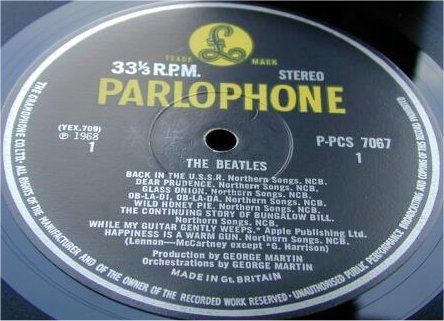
MFSL Pressing
There is also a Japanese MFSL pressing which is quite sought after.
Here is an example label:
